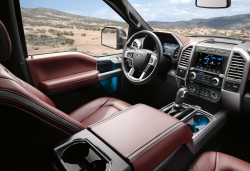
— A Ford F-150 seat belt pretensioner fire lawsuit has been dismissed after the judge ruled, "without a concrete injury that is fairly traceable to Ford’s alleged wrongdoing, the plaintiffs cannot sustain their claims."
The 2015-2018 Ford F-150 class action lawsuit was filed after the automaker recalled the trucks because the seat belt pretensioners caused fires when the pretensioners deployed in crashes.
A seat belt pretensioner is used to secure an occupant in the seat by tightening the belt to minimize slack, then locks the seat belt into place.
The Ford F-150 trucks use pyrotechnic pretensioners equipped with electronic sensors to detect crash events. The sensors trigger an explosive charge to quickly retract the seat belts, then the pretensioners must be replaced.
The problem comes in when the pyrotechnic device in the pretensioner may cause a lot of sparking which may ignite flammable gas exhausted from the pretensioner. This can ignite insulation and carpet located near the pretensioner and cause fires following a crash.
In August 2018, the National Highway Traffic Safety Administration (NHTSA) opened an investigation into reported F-150 pretensioner fires, and in September 2018 Ford recalled about 2 million F-150 trucks. At that time, at least 17 fires had been reported in the U.S.
Ford will be required to submit quarterly status reports to NHTSA for “six consecutive quarters beginning with the quarter in which the campaign was initiated.”
The judge noted the plaintiffs who sued never allege Ford has failed to comply with its obligations to NHTSA.
According to the lawsuit, Ford's recall won't do anything to fix the problems and the pretensioners will “continue to produce excessive sparks capable of igniting with flammable gas exhausted from the defective pretensioners which remain installed in their defective state in all Vehicles.”
Two F-150 owners filed the class action, but neither owner claims they had any problems with their truck.
Emery Sugasawara and Vincent Tumbarello say the recall repairs aren't good enough and a safety hazard still exists in the trucks.
Judge Lucy H. Koh dismissed the lawsuit after concluding plaintiffs Sugasawara and Tumbarello "failed to allege plausibly a concrete, imminent injury that is traceable to Ford’s conduct."
Ford pointed out to the judge how neither Sugasawara nor Tumbarello allege the defect manifested in his truck, let alone that he experienced any harm. Instead, the plaintiffs claim they were still harmed due to the cost of repairing the trucks, the risk of future injury and due to economic losses from overpaying for their Ford F-150s.
The judge said she "easily rejects Plaintiffs’ first alleged injury, which is that Plaintiffs have been damaged by the cost of repairs required due to seatbelt pretension problems.”
The argument seems bizarre because the lawsuit makes no claims that the plaintiffs paid to repair or replace parts of the trucks. The judge noted Ford's recall repairs are free of charge to all owners of the affected trucks, so it won't cost anyone to receive the repairs.
The judge then moved to the claim that F-150 truck owners are “being subjected to potential risk of injury,” because “the recall remedy proposed by Ford is insufficient.”
To qualify as an injury, an alleged harm must be “concrete and particularized” and “actual or imminent, not conjectural or hypothetical.” According to the ruling, the plaintiffs didn't allege a credible threat of harm and "have not plausibly alleged that Ford’s recall remedy will fail to cure the Defect."
The judge also notes how NHTSA approved the recall repairs, will be monitoring the recall repairs and the plaintiffs offer no proof the recall will fail.
Finally, the judge ruled on the claim F-150 customers overpaid for their trucks. The ruling says the plaintiffs failed to adequately allege the pretensioner fire risk remains after the recall repairs are performed.
"If the post-recall remedy Vehicles perform as they would without the Defect, then it follows that the Vehicles’ pre-defect values have likewise been restored. Thus, Plaintiffs have not articulated any plausible theory of economic loss." - Judge Lucy Koh
Although the entire pretensioner fire lawsuit was dismissed, the judge gave the plaintiffs permission to amend their lawsuit, if they choose.
The Ford F-150 seat belt pretensioner fire lawsuit was filed in the U.S. District Court for the Northern District of California, San Jose Division - Sugasawara, et al., v. Ford Motor Company.
The plaintiffs are represented by Ahdoot & Wolfson, Greg Coleman Law, and Whitfield, Bryson & Mason.




